Q? How much money are we talking about?
Answer - there are around $330 billion of Russian central bank assets currently immobilized in Western jurisdictions, around two thirds of this is in the EU, mostly in France and Belgium, with the balance in the UK, US, Japan and Switzerland. The weight in France and Belgium is due to the role played by Euroclear, the financial depository.
JOIN US ON TELEGRAM
Follow our coverage of the war on the @Kyivpost_official.
Actually, the total of Russian assets immobilized in Western jurisdictions amounts to nearer to $400 billion if you include oligarch assets.
To put this into perspective this is equal to the last World Bank/Kyiv School of Economics estimates as to the reconstruction costs for Ukraine from the damage wrought by the Russian invasion - data as of last autumn. It would also cover four years of the current cost of supporting Ukraine in war, which is running at around $100 billion a year.
Q? Why have these assets already not been seized and allocated to Ukraine, I mean you have been arguing the case for this now for almost two years?
Answer, where do I start? It is like pulling teeth, getting our leaders to do what is required and pretty obvious.
Opposition to seizing and freezing is varied, and concerns rest on ensuring there is the right legal basis for moving to seize and allocate given sovereign immunity defenses for Russia, how this impacts on perceptions of the rule of law in Western jurisdictions, how this might impact on the dollar and Euro as reserve currencies and whether Russia might retaliate by seizing Western assets in Russia.

Russia, China FMs Meet as ASEAN Talks Get Underway in Laos
I think all these arguments are weak, and do not stack up when compared to the national security imperative of ensuring Ukraine wins the war and ensuring at least it does not lose. Taking them one by one:
First, Zelikow, Zoellick and Ziskina have made a case that a state only benefits from sovereign immunity when it is abiding by international law. In this case Russia clearly is not, as it has invaded Ukraine, stolen territory, and so obviously trampled on international law. Who could deny this? Under the “countermeasures” argument, Zelikow et al argue that Russia’s sovereign immunity lapses unless it returns to compliance with international law in this case, and in the intervening period it’s assets can be seized and then allocated to Ukraine.
Second, laws are made by politicians and policy makers. And if the laws currently do not exist in Western juridications to seize and allocate Russian assets to Ukraine, then these laws should be legislated for. In the US, the laws already exist, however, as has been tested in respect to Iraqi and Afghanistan central bank reserves, where presidential executive orders were used to freeze and seize central bank assets first from the Saddam Hussein regime in Iraq (paid to Kuwait for the invasion in the first Gulf War) and then from the Taliban regime in Afghanistan.
In Europe laws might need to be changed, but needs must. If the West deems the threat from Russia as existential then it should be a national security priority to make this happen.
Third, on the sanctity of the rule of law in the West argument, the question has to be asked where the rule of law was when all this dirty (proceeds of Kleptocracy and autocracy) Russian money entered in the first place. It has been clear for more than a decade what the Putin regime was (a fascist dictatorship), why were the right questions not asked earlier? The West should hence not be so sanctimonious now about the sanctity of the Western rule of law - the West accepts, even promotes itself to receive, the laundered funds from jurisdictions where there is no rule of law, and once these funds land in the West they somehow become “cleansed” and then protected by “rule of law”. Double standards.
Fourth, on the reserve currency threat the fear is that other authoritarian regimes with large central bank holdings in the West - think here China and the Gulf - might fear that their assets can similarly be seized hence move these assets, destabilizing the dollar, the euro or pound. So far there is little evidence that this has happened with the move to immobilize Russian assets, with the signal already sent by G7 nations that Russia is never getting this money back.
The reality is China and other authoritarian regimes have limited options to park their trillions of dollars in FX reserves as there are simply few liquid alternatives and they don’t really trust each other enough to swap their reserves with each other. One might actually argue by acting now to penalize Russia for its actions in Ukraine this will send exactly the right message to other authoritarian regimes not to partake in invasion, war crimes and genocide, or their assets will be seized. If these regimes want to keep their assets safe in Western jurisdictions, then just abide by international law.
Fifth, stranded Western assets in Russia (sub $100 billion) are dwarfed in reality by the $400 billion odd of Russian money in Western juridications. Meanwhile, Russia is already moving to confiscate these assets vis forced sales. And in any event the question should be why Western national security interests should be put behind the interests of Western business that made bad investment calls investing in Russia in the first place.
The writing was long on the wall but these Western businesses chose to reap the profits by remaining invested in a country headed by a fascist regime. They should not now be bailed out by Western taxpayers. We should not care about what happens to Western beer companies, or yoghurt makers with investments in Russia - their own shareholders should be asking their management what the heck were they thinking of?
The arguments against confiscation are weak, but a powerful lobby of Westen business invested in Russia, central banks and Westen treasuries are rallied against the idea of using immobilized Russian assets for Ukraine.
There is certainly I think bureaucratic inertia in Western central banks and Treasuries - “the computer says no” kind of approach. It’s difficult, for sure, and it is easier in the short term perhaps just to say no. But I would counter that the longer-term risks of getting this wrong far outweigh the short-term difficulties. And therein I think a problem is that many of the decision makers are those for whom national security is not a specialism, or else they have long got the Russia call wrong. For much of the past two decades those blocking this move have been on the wrong side of history on everything to do with Russia.
Q? What is the alternative?
Answer - now we get to the crux of the matter.
I would turn the question on its head and ask opponents what is the alternative to using immobilized Russian assets to ensure Ukraine’s victory in war, and successful reconstruction?
The starting point has to be the maths of what it takes to support Ukraine. Roughly this has been running around $100 billion a year in war, comprising roughly $40 billion fiscal and balance of payments support and the rest military. Assuming peace, and a likely reconstruction bill of $500 billion plus, I make it $50 billion a year in peace.
Already the West is struggling to cover the $100 billion annual bill. The US roughly covers half the total of $100 billion a year, but with the $61 billion in Ukraine funding stuck in the House of Representatives and with the real prospect of a Trump presidency pulling the plug on all Ukrainian financing, how is the shortfall then going to be met? The EU only just, at the last minute, managed to secure agreement for a €50 billion four-year funding package for Ukraine, at the December EU council meeting. This was against stiff opposition from Orban in Hungary and with difficult European elections looming this only looks set to get more difficult. Will Europe stand up to fill the huge shortfall left by the US stepping away? I doubt it when set against a global cost of living crisis and rising populism.
Q? What about the EU scheme to use the interest in immobilized Russian assets for
Ukraine?
Answer - well at just €3-4 billion a year, it does not touch the sides when set against the $100 billion ask in time of war.
Now I have suggested one solution might be to invest the proceeds in higher yielding assets - a portfolio of EM assets could generate a 10% yield, $30 billion plus pa for Ukraine. Even better use the immobilized Russian assets to buy recovery bonds issued by Ukraine - the underlying asset would still be owned by Russia, alleviating rule of law/property rights issues. But this would give Ukraine access to all the funds it needs to win the war. Europe is though showing an abundance of caution/head in the sand type of approach - it’s like Europe actually wants to lose this war.
Q? What about ideas such as the Liberty Bond?
We heard today that the US might support using the interest stream on immobilized Russian assets to collateralize a bond program for Ukraine, up to perhaps $50 billion. Others (Singh, Dixon and Bucheit) have suggested schemes where G7 states holding the immobilized Russian assets allow Ukraine use of those assets for a pledge that once the war ends and a reparations deal is agreed the West would be compensated for funds given to Ukraine. See also Bucheit’s recent pieces in the FT and Economist. All well and good, there are lots of ways to skin a cat, my worry though with these schemes is one now of speed. They are all complicated and will take time to construct. Ukraine’s financing and military needs are now - if we don’t ensure its financing, Ukraine loses the war, with devastating consequences for it and Western security. Time is of the essence and two years in on the invasion, the G7 is still twiddling its thumbs - shades of the band playing on the Titanic.
There are lot of innovative market-based solutions, but the point is that we need to see the political will and clear strategic thinking to get this done now. We are seeing little of that.
Q? What about issues around equity and fairness?
Answer - well the obvious moral stance should be that Russia should pay for its crimes and the destruction it has wrought on Ukraine. Using immobilized Russian assets for Ukraine should be a first instalment on eventual reparations.
But it goes beyond that. At the moment Western governments are using their own taxpayer’s money to fund Ukraine, rather than tapping the ready Russian cash available in Western bank accounts - immobilized Russian assets. This suggests that our governments seem to make Russian taxpayer funds senior to those of their own taxpayers. Pretty extraordinary. Similarly, private creditors of Ukraine (mostly Western pensioners) are being asked to haircut debt owed by Ukraine, again because our governments don’t want to use Russian taxpayers’ money. And as noted above by not using immobilized Russian assets to pay for Ukraine - Western business interests in Russia, who made bad investment calls in Russia, are being put ahead of Western taxpayers. These Western businesses should not be bailed out by Western taxpayers.
The willingness of our politicians to put the Russian taxpayer above the interests of the Western taxpayer should be a huge scandal - why are journalists not focusing on this?
Q? What happens if solutions are not found?
Answer - well that’s the point for the opponents, who are not coming up with solutions. If immobilized assets are not used for Ukraine, Ukraine loses. In that case the long-term costs to the West are multiples larger. Obviously even bigger for Ukraine, as it ceases to exist.
If Ukraine loses this war Russian tanks move West, threatening the Baltic states and Poland. NATO defense spending will have to increase by as much as 1% of GDP pa, which could add well over $100-200 billion, if not much more, to annual Western defense spending. That is more than the annual bill for helping Ukraine win the war. Moreover, a Ukrainian defeat would see tens of millions of Ukrainians move West, causing social, economic, and political instability across Europe - further fueling right wing populism. Hungary might seize on a Ukrainian defeat to take territory in Ukraine - Transcarpathia, as part of a Greater Hungary policy. This could see wars break out across Europe, as others try and carve out their own version of the Greater Country agenda. The irony here is the ECB is worried that allocating immobilized Russian assets to Ukraine would undermine confidence in the Euro as a reserve currency, but the bigger risk would be of a Ukrainian defeat, and the huge defeat that would imply for Europe. If Russia wins in Ukraine, the euro will collapse.
Q? Ok, so will this happen?
Answer, absolutely. It’s the same as the long list of decisions around Javelin, Mig29s, T72s, S300s, HIMARS, Leopards, F16s. Our Western decision makers try and do everything they can to not do the obvious, but eventually are left with no choice of doing what they have to do, albeit always too little, too late. And Ukraine always pays in the blood of its brave soldiers.
In the end it boils down to the fact that our decision makers consistently fail to understand the threat from Russia, and the risks if Ukraine is allowed to fail. They consistently fail to understand what is required to win this war, that we simply cannnot afford to lose. Clarity of thought and leadership are required but sadly lacking. Shame on them, and sad for Ukraine.
Reprinted from the author’s @tashecon blog. See the original here.
You can also highlight the text and press Ctrl + Enter






